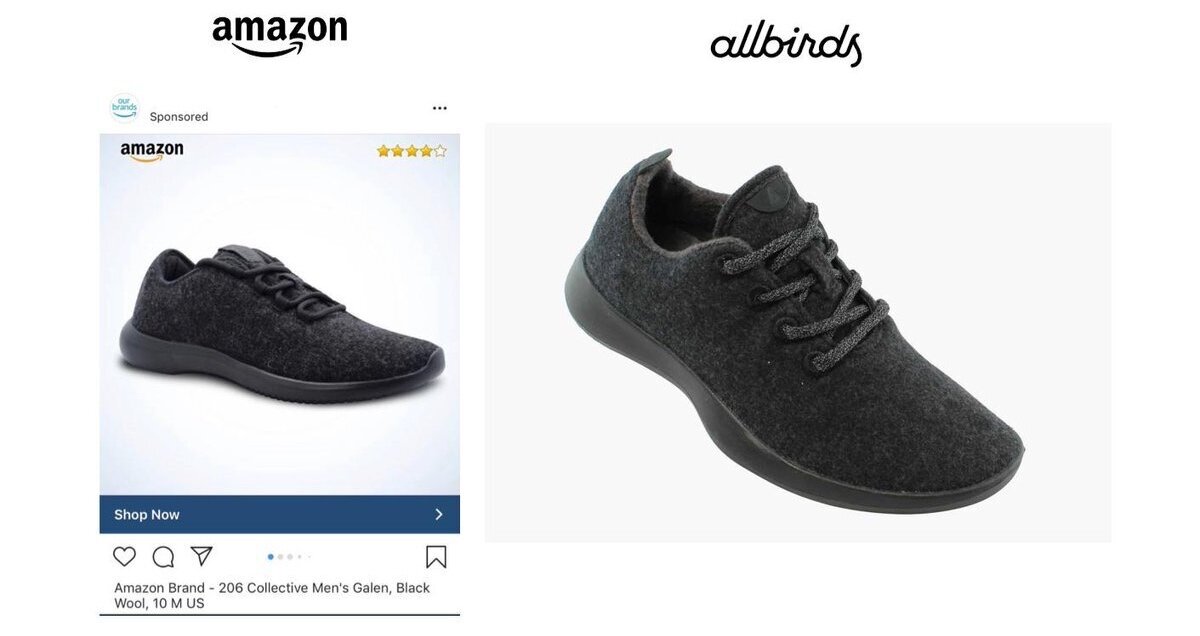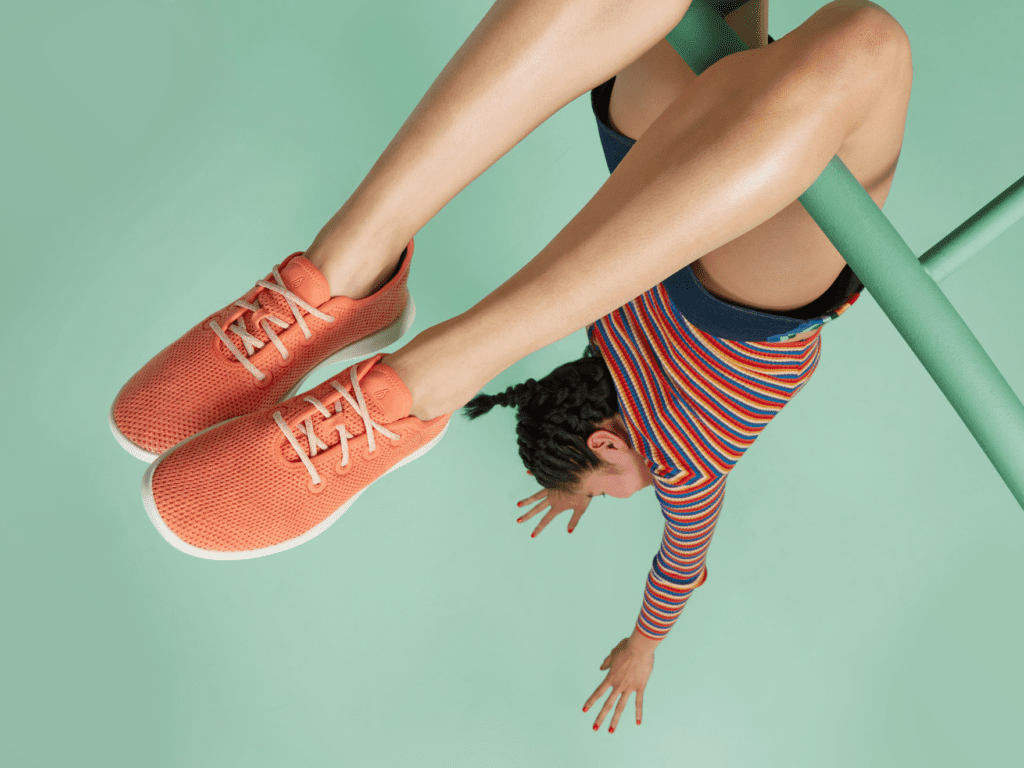In a matter of five years, Allbirds has managed to build what it says is a $1.4 billion business based on what have been called “the world’s most comfortable shoes.” Under the watch of co-founders Tim Brown and Joey Zwillinger, the San Francisco-based sustainable footwear startup has largely made its name thanks to its marquee Wool Running sneakers, which are part of “an entirely new category of shoes, ones inspired by natural materials,” something of a rarity in the athletic shoe world. Now, Allbirds and its “it” sneakers are being knocked off.
On the heels of filing a since-settled lawsuit against Steve Madden in late 2017, claiming that the trendy footwear giant ran afoul of trademark law by copying its wool trainer, Allbirds is suing again. This time the buzzy brand is taking on Austrian footwear company Giesswein Walkwaren for manufacturing and selling sneakers that are “identical in all material respects” to Allbirds’s Wool Runners.
According to the complaint that Allbirds filed in with the U.S. District Court for the Northern District of California early this month, Giesswein is on the hook for “deliberately and willfully copying Allbirds’” footwear – which is protected by trade dress, a subset of trademark law that extends to the appearance of a product that serves to indicate its source in much the same way as a brand name or logo – and its trademark protected “Wool Runners” name.
What is Allbirds’ trade dress exactly? The brand claims that it consists of a “sneaker-type shoe featuring wool-like texture on the entirety of the upper outer; embroidered eyelets; shoelaces composed of a three-yarn lace woven together; midsole and outsole of shoe appear attached as one piece; and a series of horizontal lines visible across the width of the sole of the shoe that extends the entire length of the sole.”
In much the same way as consumers have come to associate the Allbirds name with “revolutionary footwear,” the footwear company claims that as a result of its “extensive advertising and promotion of” its Wool Runners, “widespread media coverage of [its] Wool Runners shoee,” the “immediately distinguishable, unique and distinctive appearance” of the shoes, themselves, and its sale of “millions of dollars-worth of Wool Runners shoes,” consumers have come to associate the mere appearance of the woolen running shoes with the Allbirds brand, thereby giving rise to trade dress rights, which Giesswein infringed by making copycat footwear.
Allbirds asserts that Giesswein acted willfully in creating what is infringing footwear line that not only imitates the look of Allbird’s Wool Runners footwear (allegedly) but also makes use of its Wool Runners trademark in their title, something that is likely to cause confusion amongst consumers as to the source of the lookalike-but-entirely unauthorized shoes.

More than that, though, Giesswein has allegedly refused to stop “audaciously and falsely advertising” itself as the original creator of Wool Runners footwear on social media, and instead of “remedying their confusing use of the Wool Runners brand and misleading advertisements,” Giesswein responded to Allbirds cease and desist demands by asking the U.S. Patent and Trademark Office to cancel Allbirds’s federally registered “Wool Runners” trademark, arguing that “wool runners is a generic or merely descriptive” term.
With all of this in mind, Allbirds has called foul, citing claims of trademark and trade dress infringement, false advertising, and federal unfair competition, among others, and has asked the court for preliminary and permanent injunctive relief. The company also wants the court to require Giesswein to destroy any infringing or diluting footwear products, in addition to paying Allbirds an array of damages.
And still yet, Allbirds seems to have become the latest target for one of Amazon’s private labels. Social media users were quick to point out a lookalike pair of sneakers that Amazon very-recently began offering up by way of its 206 Collective in-house footwear brand. At $45, the Men’s Galen Wool Blend sneaker – which shares a few lookalike elements as Allbirds’ marquee sneakers, such as the color and woolen material but maybe most notably, a similarly-shaped sole – is about half the price of the real thing. The similarities have prompted social media commentary (“We have reached peak cloning,” wrote one Twitter user) and no shortage of media attention, all pointing to Amazon’s lookalike shoe and calling … “Copy!”

As for whether Allbirds has a leg to stand on, legally, in pursuing Amazon, or Giesswein for that matter, purely from a trade dress/design perspective, it seems unlikely. While the appearance of Allbirds’ Wool Racers may rise to the level of secondary meaning/consumer recognition required to enjoy trade dress protection in the first place (although that is not necessarily a guarantee), it is worth noting that there are, in fact, notable design differences between the various brands sneakers, and thus, there might not be trade dress infringement at play.
The differences between Allbirds sneakers and the ones being sold by Giesswein and Amazon, whether it be the differing shoes between Allbirds’ shoes and Giesswein’s or the distinctly different lacing of Allbirds’ shoes versus Amazon’s are significant, as University of Idaho School of Law professor Annemarie Bridy stated, it is “helpful to remember that copying is not legally actionable when it doesn’t infringe [others’] intellectual property rights,” which might be exactly what is going on in both the actual lawsuit that Allbirds filed against Giesswein and the purely hypothetical one against Amazon. “Intellectual property rights are the exception,” Bridy further asserted,” and “free competition is the rule – even where big [companies] copy small [ones].”
Meanwhile, Giesswein is in the midst of litigation with Rothy’s, another of-the-moment direct-to-consumer footwear startup, which accused it of by infringing the “distinctive shape and design” of its design patent and trade dress-protected The Flat ballet flats.
That case, which joins a handful of other direct-to-consumer brand litigations as young consumers goods startups continue to win over millennials shoppers, is also currently underway in the U.S. District Court for the Northern District of California.
The case is Allbirds, Inc. v. Giesswein Walkwaren AG et al, 3:19-cv-05638 (N.D. Cal.).














